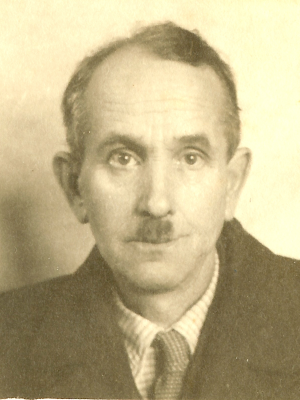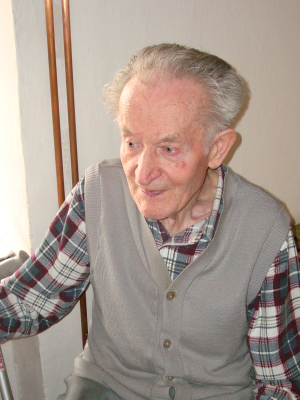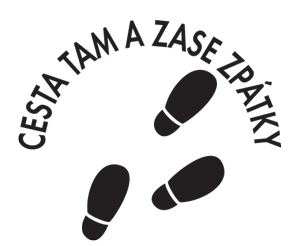“So, are you joining or not?“ - The Story of Mr Havelka
 Youth
Youth
Mr Antonín Havelka was born on February 2, 1894 in Věchnov at Bystřice nad Pernštejnem into a working-class family. He received only elementary education, considered sufficient at that time. He was deeply religious and attended church services regularly. He and his wife raised three children; a fourth child had died. He worked as a miner at the mine in Železinka ve Věchnově. We were told about his life by Mr Pacner.
Mr Havelka wanted to be a farmer, to plow the land. He decided to buy a farm. In the village of Bobrůvka, there lived a certain Mr Havránek who got into debts and his property therefore went into auction. It was his farm that Mr Havelka was able to buy at an affordable price. His family moved to Bobrůvka and applied themselves to work at the farm..
Pressure from the IAC and the Communists
When the Communist party came to power, they intended to persuade all the farmers to enter local Integrated Agricultural Cooperatives (IAC). In Bobrůvka, the IAC was founded in 1951, however, as late as 1953 there weren't many who would join. Mr Havelka refused to enter because he was fond of all that belonged to him.
“People worked on the field from morning to dusk, then an official would come with a pack of Communists, they would call the farmers from the fields into an office and, all of a sudden, they wanted to persuade them to enter the cooperative? And if they'd refuse, they'd be sentenced to prison? They threatened that the children would be denied the possibility of good education. It was unheard of that a farmer's children would be going to schools. They were to go from pitchfork to shovel.”
At the meetings (of the IAC), he was informed of how much of his own produce he'd be charged to hand over. All the farmers knew that there would be close to nothing left for their private use from what they were assigned to give to the regime. More threats were made about the hardship awaiting their children if they did not comply. Mr Havelka, however, fulfilled the contribution norms despite all the gauchery and remained firm in his decision not to enter the IAC.
How did he get jailed?
In 1956, Mr Havelka listened to an illegal western radio broadcast, where he learned that “in Hungary, they're throwing Communists into the Danube.” He thought that the same would happen in Czechoslovakia. When he went to look at his fields he saw members of the IAC plowing there. He told them to stop working because in a while everyone would be tending their own land again. But the IAC members turned him in and he was sent to jail.
Court proceedings and prison
Mr Havelka dind't even ask for an attorney and did the defense by himself. However, no one else stood up for him at the court and the people from Bobrůvka even turned against him. The reason could have been envy, fear, or simply the fact that the Havelkas had only recently moved in, “driftwood” as they say. He was sentenced to three years of prison.
In the prison house in Illava, Slovakia, he was forced to hard labor from morning to evening and, he received food in proportion to how much work he had done. “In prison, folk had to work. If they failed to fulfill the daily norm, they wouldn't get any food. When work was over, political lectures ensued. They worked about twelve hours per day, then there were the lectures, and if anybody said anything wrong and a guard didn't quite like it, they beat them badly in most cases. If anybody protested they were shut into isolation cells. That meant up to a month in a cell, two by two meters. In the morning, their bed was locked-up and they had to stand on their feet throughout the remainder of the day.”
The Communists made the life of Mr Havelka's family bitter, too. However, other villagers helped and supported them.
Consequences of imprisonment and further worries
When he came back from prison, Mr Havelka's health was very bad. The communists continued in their effort to force him to join the IAC even after his release. It was less the physical than the constant psychological pressure they exerted on him, e.g. waking him up early in the morning and trying to convince him about their “truth”. Notwithstanding it all, Mr Havelka, remained firm and joined neither the IAC nor the Communist party. What he thought was what he said and he also stood for it.
What happened after his death?
Mr Havelka died on June 4, 1979, his widow surrendered to the relentless pressure and entered the IAC, and so the Havelka family ended up like all the other families in the village. We are unaware of any other similar case from the period of collectivisation in Bobrůvka.
He wanted to become a priest and, instead, ended up in Jáchymov – the story of Jiří Šoustar
 Youth
Youth
Jiří Šoustar was born on April 21, 1925, in the village of Bobrová. His father Cyril Šoustar was a baker. His mother Jindřiška also worked in the bakery. Jiří also trained to become a baker and after his father's death in 1947 he took charge of the bakery. For more than a year, he worked as a baker together with his mother. There was also his sister, Františka, in the family who was one year older.
The way to priesthood
A year after his father's death, Jiří decided to become a priest. He moved to Bruntál, where there was a school, and he stayed there for about two years. Then he enrolled in a catholic high school in Brno which has moved to Barvičova street since.
Later, he continued his studies at the Papal high school in Velehrad but the school was soon shut down. The transfer of the students to Uherské Hradiště was dramatic. “Cars arrived, at night, that was from the thirteenth to fourteenth of April, 1950 (this was an instance of the state-wide crackdown on religious institutions, known as Akce K), and they woke them up [i.e. the monks] in the dark of the night, and they had it all planned out in advance, and fast they had to tell them something. Where they were going, they weren't told, and us, when we got up in the morning, well, they told us: 'Either you go back to your parents or you finish your studies in Uherské Hradiště.' Some of us went home and some of us went to the high school in Uherské Hradiště, so we did our fourth year there and stayed until the baccalaureate.”
Escapes to Austria
One of Jiří's classmates escaped across the border to Austria and returned from there, with the intent to convince others to elope with him.
“When he came back, they caught him, well and that got us into troubles. Well, it was in our final year, we were supposed to do our final exams. When we met this classmate of ours he wanted to win us for Austria, but the police caught them all somewhere around Znojmo or in Southern Moravia, and at once there was an investigation and they went after us. And in the end, they told us that we would not be allowed to take our final exams.” Jiří had nothing to do with the escape, nevertheless, he does not have a baccalaureate to this day.
Arrest and trial
Jiří and his classmates decided to stay in Uherské Hradiště and take a summer job helping at local sheepfolds. It was in Uherské Hradiště that he was arrested. “It was the night, my eyes were wide open. Suddenly, the police came, I was to go with them. Then we were interrogated for about a week, and then there was a trial. We were a group of ten all in all.” Jiří was interrogated directly in Uherské Hradiště. The trial took place a week after his arrest. “Well and the one who organized the escape got ten years, I got two and a half.” They were accused of high treason.
Imprisonment
Until August 14, 1952, Jiří worked on the construction site of the airport in Kunovice. Then, he was transferred to the central camp in Ostrov near Karlovy Vary and then to Jáchymov, a town with nearby uranium mines. “First, we came to Mariánská, a former monastery. Then they separated us and told us we were going to mine ore.”
He worked in a uranium mine called Adam and Eve. “At first they asked if we'd like to go down below. Nobody had any intereste in that whatsoever, we didn't want to hear any of it, naturally. But then they told us that those who were sick or weak could remain on the surface. Every morning, we had to line up; that took about twenty minutes, and then they marched us to the mine where they divided us. My job was to push the mine carts, full of ore.”
Even though they work hard, they received little food and drink. They had a kilogram of bread for three days. “Well, we got that when we went into the mine; we got black coffee and bread, but all that was so little.” Throughout the whole time, Jiří was very hungry.
Life in the labor camp
There were a many wooden barracks there. They would sleep on bunk beds, all who were in one barrack would sleep in one room. Watchtowers were erected in every corner of the camp where the State Security guards were keeping watch. “When we came back from the mines, that was in the winter, there was a fence around the entire camp; and a sort of walkway, separated by barbed wire, and we had to tread down the snow.”
Or, the prisoners had to clean up where the State Security lived, near the monastery. “Sometimes, when we went to work, someone would try to escape. Well, then there were always searches and investigations afterwards. For example, during roll calls, the guards checked our number, and oftentimes it happened that they couldn't make the appropriate sum, so we had to stand there for a very long time, and we stood there until they would come to the conclusion that somebody was missing. Sometimes we would come back from work, line up, and they'd tell us there would be a “filcunk”, and that was like they searched us, we had to undress and what not.”
Christmas and other holidays were not observed in the camp. “Christmas Day was a normal day. We went to work us usual.” Contact with the family at home was very scarce. Occasionally, he was permitted to write and send a letter, and only once during his entire imprisonment was his family permitted for a visit.
The return home
Jiří's sentence was shortened by one year. “So I was suddenly released in January 1954. It was around the 8th of January, I think. There was a general pardon.” He had to register with the local authorities within three days and was assigned a job in a flax processing factory in Bobrová. Later, he worked as a warehouseman.
Jiří had no further troubles with the police. For decades, he was librarian in Bobrová. In 1958, he got married. He had four children and was rehabilitated after the fall of Communism in 1989. He lives happily with his wife in Horní Bobrová.


 Youth
Youth
 Youth
Youth
































